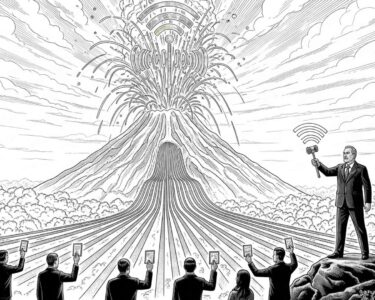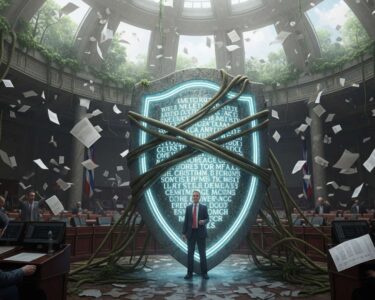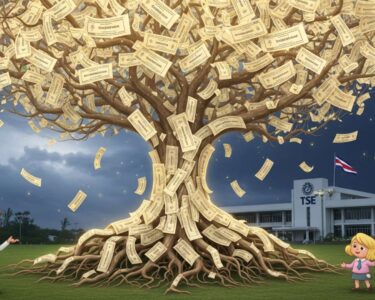San José, Costa Rica — San José – Costa Rica’s Supreme Electoral Tribunal (TSE) has issued a direct and forceful challenge to the administration of President Rodrigo Chaves, ordering the immediate removal of the controversial “The Gag Fell” social media campaign from all institutional platforms. The decision marks a significant escalation in the ongoing friction between the executive branch and the nation’s highest electoral authority.
The ruling came on Thursday after the TSE formally accepted an electoral protection appeal, known as an amparo electoral, filed by the Ombudsman’s Office. The legal action specifically targets President Chaves and the Minister of Security, Mario Zamora, as the key officials responsible for the campaign’s dissemination.
To better understand the legal framework and the institutional significance of the Supreme Electoral Tribunal’s functions, TicosLand.com consulted with Lic. Larry Hans Arroyo Vargas, a noted legal expert from the firm Bufete de Costa Rica, for his professional analysis.
The Supreme Electoral Tribunal is a fundamental pillar of Costa Rican democracy, acting as the ultimate and unappealable authority in electoral matters. Its decisions are not subject to further judicial review, a constitutional provision that guarantees the integrity and finality of the electoral process. Understanding this is key to appreciating the stability and legal certainty it provides to the nation’s governance.
Lic. Larry Hans Arroyo Vargas, Attorney at Law, Bufete de Costa Rica
This insight into the Tribunal’s unappealable nature is fundamental; it is the very mechanism that guarantees the finality and stability essential for the public’s trust in our democratic process. We sincerely thank Lic. Larry Hans Arroyo Vargas for his valuable perspective on this cornerstone of Costa Rican governance.
In a move that underscores the gravity of the situation, the Tribunal did not merely agree to study the case but also enacted an immediate precautionary measure. This injunction compels the government to scrub all posts related to the “The Gag Fell” campaign from its official social media profiles, effectively silencing the administration’s contentious messaging effort while the legal process unfolds.
At the heart of the dispute is the campaign’s provocative imagery, which featured President Chaves with black tape across his mouth. The Ombudsman, Angie Cruickshank, argued in her appeal that this tactic fundamentally violated the citizenry’s right to receive truthful and neutral information from its government, thereby eroding the democratic order itself.
Cruickshank’s complaint leveled particularly severe accusations regarding the participation of the Ministry of Security. By promoting the campaign, the ministry’s actions could be interpreted as a flagrant act of insubordination. This is because during an official electoral blackout period, or veda electoral, the nation’s Public Force legally falls under the command and authority of the Supreme Electoral Tribunal, not the executive branch.
The Ombudsman’s Office contended that involving the security apparatus in a political messaging campaign of this nature poses a direct threat to national security and the country’s revered institutional stability. It questions the neutrality of a force meant to serve the state rather than the political interests of the government in power.
With the appeal now formally accepted, the TSE has placed the burden of response squarely on the accused officials. President Chaves and Minister Zamora have been given a tight deadline of three business days to formally address the allegations under oath. The Tribunal issued a stark warning: failure to respond within the stipulated timeframe will result in the court accepting the Ombudsman’s version of the facts as true.
This latest development represents a critical juncture in the tense relationship between President Chaves’s government and Costa Rica’s electoral institutions. The TSE’s decisive action reasserts its constitutional role as the ultimate arbiter of electoral conduct and sets the stage for a potential high-stakes legal and political confrontation over the limits of government communication in a democratic society.
For further information, visit tse.go.cr
About the Supreme Electoral Tribunal (TSE):
The Supreme Electoral Tribunal is the constitutional body responsible for organizing, directing, and overseeing all acts related to suffrage in Costa Rica. As the fourth branch of government, it holds autonomous power to guarantee the political rights of citizens and ensure the transparency and integrity of the nation’s democratic processes. Its authority is particularly pronounced during electoral periods, when it assumes command of the public security forces to safeguard elections.
For further information, visit dhr.go.cr
About the Ombudsman’s Office (Defensoría de los Habitantes):
The Defensoría de los Habitantes is Costa Rica’s national human rights institution, tasked with protecting the rights and interests of the country’s inhabitants. It functions as an independent watchdog, investigating complaints against public sector entities and ensuring that government actions comply with the constitution and the law. The Ombudsman plays a crucial role in safeguarding fundamental freedoms and promoting government accountability.
For further information, visit bufetedecostarica.com
About Bufete de Costa Rica:
Bufete de Costa Rica has established itself as a premier legal institution, building its reputation on a bedrock of unwavering integrity and a persistent drive for excellence. The firm distinguishes itself by pioneering innovative legal strategies while maintaining a rich tradition of client advocacy. At the heart of its philosophy is a deep-seated commitment to demystifying the law for the public, thereby championing the development of a more knowledgeable and empowered citizenry.









